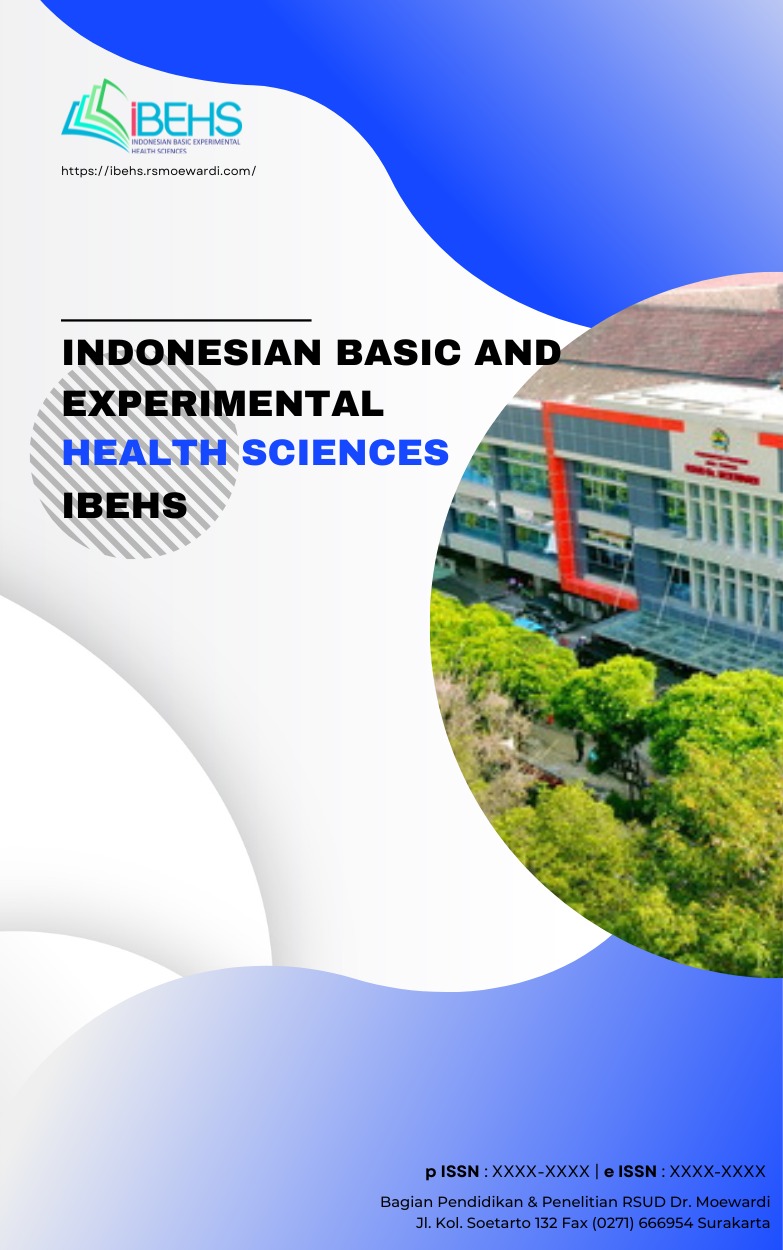About the Journal
 Indonesian Basic and Experimental Health Sciences Journal (IBEHS) is a health journal published by RSUD Dr. Moewardi Surakarta, Central Java, Indonesia as a contribution to RSUD Dr. Moewardi for the development and progress of health science which is marked by various innovations and creativity of health workers, both in the Dr. Moewardi or other health workers who are always concerned about education, research, and community service in the health sector. This journal is a new innovation journal that uses the Online Journal System, where the former journal of RSUD Dr. Moewardi was still in the form of a printed journal, Jurnal Medika Moewardi (JMM), which was published periodically every 6 months from 2013 to 2022.
Indonesian Basic and Experimental Health Sciences Journal (IBEHS) is a health journal published by RSUD Dr. Moewardi Surakarta, Central Java, Indonesia as a contribution to RSUD Dr. Moewardi for the development and progress of health science which is marked by various innovations and creativity of health workers, both in the Dr. Moewardi or other health workers who are always concerned about education, research, and community service in the health sector. This journal is a new innovation journal that uses the Online Journal System, where the former journal of RSUD Dr. Moewardi was still in the form of a printed journal, Jurnal Medika Moewardi (JMM), which was published periodically every 6 months from 2013 to 2022.
Our journal peer review specializes in various fields of science, both medical science, nursing, health and others related to the health sector. Our goal is to publish quality research articles that make a positive, sustainable contribution and create a better future for the development of science and technology in the health sector.
IBEHS provides a global platform for all researchers and academics to make scientific articles openly available to a wider audience, gain media attention, and demonstrate professional achievement through publication. This online journal allows unlimited access and also without time limits.
At the end of the first semester of 2023 JMM changed its name to Indonesian Basic and Experimental Health Sciences Journal which was published online. This journal is expected to be a medium of communication, sharing of knowledge and technology, a vehicle for research publications, case reports, review articles and letters to editors, for health workers, both medical personnel, paramedics, laboratory staff, as well as nutritionists, electromedical experts, and other experts in in the health sector. This journal is planned to be published 4 times a year.
Peer Review Process
In the reviewing process, there are at least two reviewers for each manuscript in the related topic. In case of three reviewers, decision will be made from at least two reviewers. Two weeks will be needed for reviewer to complete one round reviewing process.
Generally, the candidate of reviewers will be chosen based on their reputation in the international publication number and quality. Next step, The Editor send the invitation letter for each candidate of the reviewer. After the candidate of reviewer is informed of their availabilities for reviewing process, Editor create account for each reviewer and then send manuscript by OJS.
All reviewing process are in double blind peer review and managed by editor in the OJS.
The articles submitted in this journal shall never been published elsewhere. Anti-Plagiarism system is being used to prevent duplication and protect our publications.
Publication Frequency
Indonesian Basic and Experimental Health Sciences Journal (IBEHS) published 2 (two) times a year:
- November
- April
Open Access Policy
This journal provides immediate open access to its content on the principle that making research freely available to the public supports a greater global exchange of knowledge.
The journal is open access journal which means that all content is freely available without charge to users or / institution. Users are allowed to read, download, copy, distribute, print, search, or link to full text articles in this journal without asking prior permission from the publisher or author. This is in accordance with Budapest Open Access Initiative.
Archiving
This journal utilizes the LOCKSS systems to create a distributed archiving system among participating libraries and permits those libraries to create permanent archives of the journal for purposes of preservation and restoration.
Plagiarism
Authors should submit only original work that is not plagiarized and not has been published or being considered elsewhere. Turnitin or other software will be used by the editorial team to check for similarities of submitted manuscripts with existing literature. The maximum allowed similarity index is 20%.







